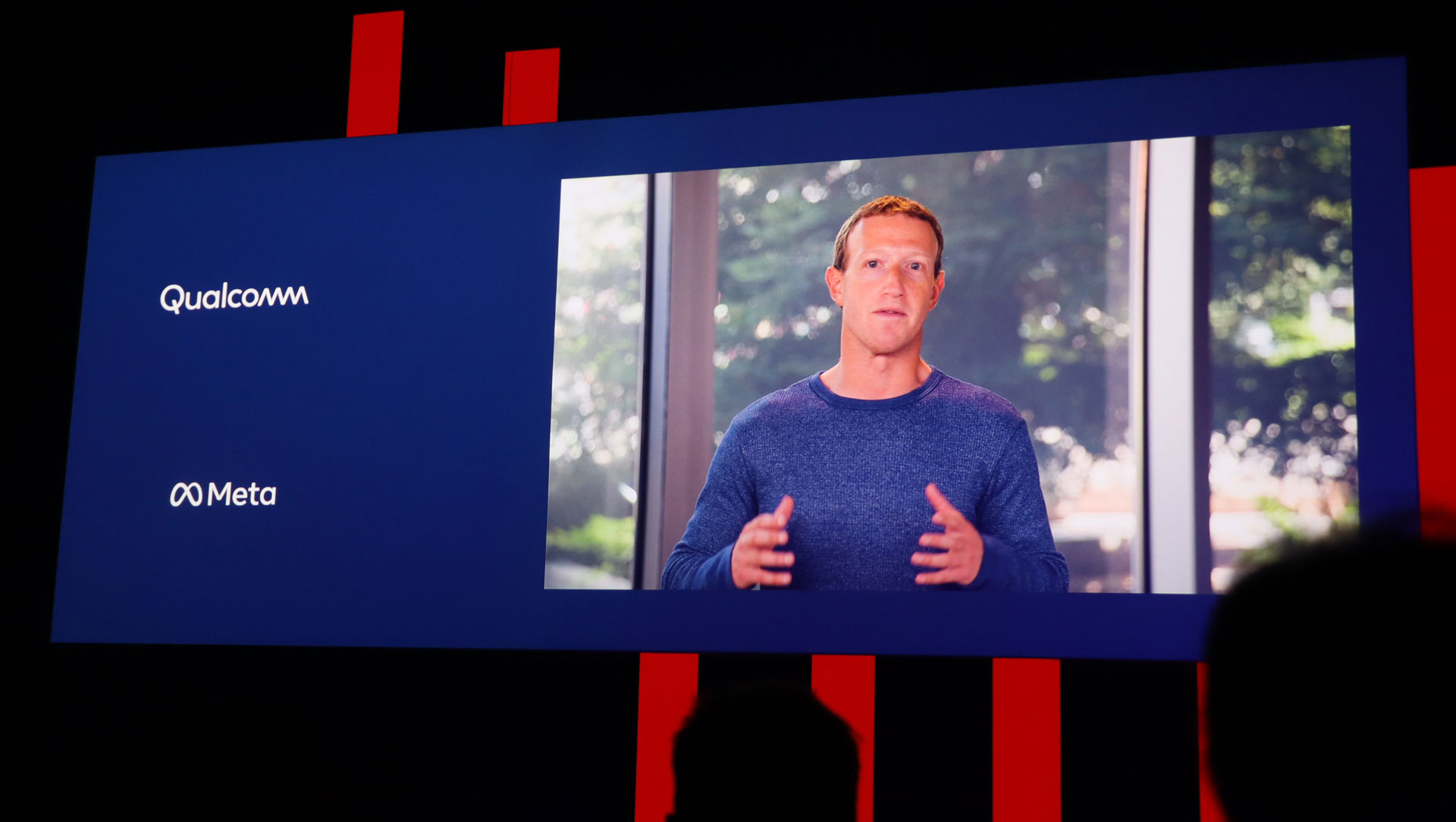We just heard the future of VR from Mark Zuckerberg – and it's all about the chips
Qualcomm and Meta announce major co-development partnership

Sign up for breaking news, reviews, opinion, top tech deals, and more.
You are now subscribed
Your newsletter sign-up was successful
Qualcomm and Meta are teaming up to take our virtual reality experiences to the next level, by developing bespoke chipsets to power the next generation of VR headsets, the two tech giants have announced at IFA 2022 Berlin.
In a speech that covered a lot of familiar ground and highlighted Qualcomm's work with multiple companies, including Bose and Samsung, Qualcomm CEO Cristiano Amon saved the best for essentially last.
Meta – parent company to both Facebook and Oculus Quest VR – and Qualcomm are not strangers. The companies previously partnered on customizing Qualcomm's Snapdragon XR platform ('extended reality') to create the Snapdragon XR2 for the Meta Quest 2. This new announcement, however, represents a deepening of the now seven-year-long relationship, with Meta and Qualcomm working to develop platform experiences specifically designed for VR operations.
"I'm proud to announce the next phase of our partnership, a deeper engineering collaboration. We will collaborate on customized VR chipsets," said Meta CEO Mark Zuckerberg, who joined the keynote via video.
Snapdragon's XR chipset is already powering 50 VR-related devices, according to Amon, but this will be the first time Qualcomm will be on the ground floor, which could mean good things for Meta's upcoming Quest 3 and Project Cambria headsets.

The partnership represents a recognition that the metaverse is set to be an important consumer experience and business opportunity for Qualcomm, which has thus far developed mobile chips that broadly address smartphones, laptops, and the growing set of mixed-reality and VR devices. Building chipsets and experiences with the metaverse in mind could mean richer experiences across a wide range of virtual activities.
Zuckerberg and Amon, though, didn't mention which upcoming headsets will feature these co-developed chipsets, or when they might appear. Also unclear is whether these features will be proprietary to Quest headsets, and if future Snapdragon XR chips will work similarly in VR gear from other companies.
Sign up for breaking news, reviews, opinion, top tech deals, and more.
There were a few other newsy tidbits from Qualcomm, including Snapdragon's future support for satellite communications. The announcement comes as companies like Starlink and T-Mobile are working on bringing satellite communications to standard 5G phones, and as Apple is rumored to be building satellite capabilities into the iPhone 14 and Apple Watch 8.
Qualcomm's Amon also hinted at some major developments in the field of electric vehicles.
"The ultimate mobile experience is the car," said Amon, adding that Qualcomm is developing an open, horizontal platform for in-car systems. He also announced a special Automotive Investor Day on September 22, at which the company will detail its auto plan.
We’ve finally gotten to the Metaverse! #IFA2022 pic.twitter.com/WzNGv5gTM9September 2, 2022
The big bet
Virtual reality is only as good as its hardware and software, so the news that we might get better chips to power new metaverse experiences is exciting. That said, the Metaverse is still largely an unproven commodity.
In a recent earnings report, Meta revealed that its Reality Labs division had burned through $10 billion in 2021. Consumers are buying VR headsets and playing games, but the take-up is far from iPhone-level ubiquitous. While most people would tell you they can't live without their smartphone, they probably wouldn't say they couldn't live without VR.
In a way, this is Meta and Qualcomm sharing the burden of driving the metaverse to the masses. Meta is the social and VR expert, but has little-to-no silicon experience. The collaboration could result in the next-gen VR headsets and capabilities we've been dreaming of.
Perhaps Zuckerberg said it best: "Unlike mobile phones, building virtual reality brings novel, multi-dimensional challenges in spatial computing, cost, and form factor. These chipsets will help us keep pushing virtual reality to its limits and deliver awesome experiences.”
IFA 2022 is Europe's biggest tech show, and TechRadar is in Berlin to bring you all the breaking news and announcements, plus our hands-on first impressions of the new TVs, wearables, audio devices, and other gadgets on show.

A 38-year industry veteran and award-winning journalist, Lance has covered technology since PCs were the size of suitcases and “on line” meant “waiting.” He’s a former Lifewire Editor-in-Chief, Mashable Editor-in-Chief, and, before that, Editor in Chief of PCMag.com and Senior Vice President of Content for Ziff Davis, Inc. He also wrote a popular, weekly tech column for Medium called The Upgrade.
Lance Ulanoff makes frequent appearances on national, international, and local news programs including Live with Kelly and Mark, the Today Show, Good Morning America, CNBC, CNN, and the BBC.